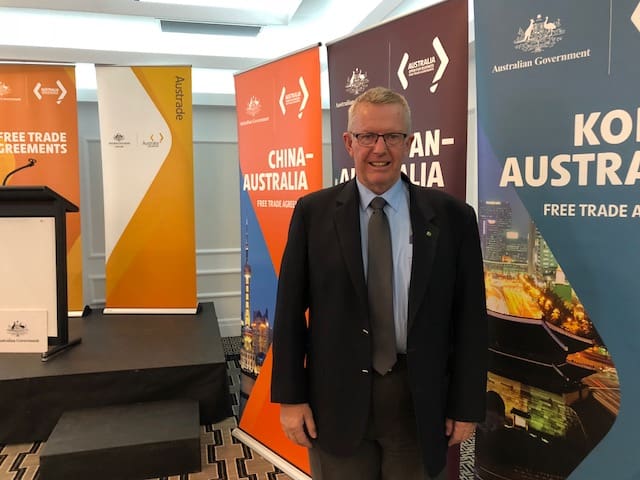WHILE tariffs may have dominated headlines with the US-China trade war, Federal Assistant Trade Minister, Mark Coulton, told a trade seminar in Toowoomba last week that it was Free Trade Agreements (FTAs) which marked the way forward for Australia.
Mr Coulton said FTAs had opened doors to trade by eliminating or reducing tariffs and quotas restricting Australia’s free trade in goods and services.
He said existing FTAs covered about two-thirds of Australia’s total trade with the world.
“Uptake and use of the FTAs has been high, covering well over 80 per cent of eligible trade.
“While we see the rise of protectionist sentiment in some countries, at this time when the global trading system is under stress, Australia will continue to stand up for free trade.”
Mr Coulton said Australia was already benefiting from the 10 existing FTAs it was already party to.
“While we see the rise of protectionist sentiment in some countries, at this time when the global trading system is under stress, Australia will continue to stand up for free trade.”
He said they opened trade doors, gave Australian goods a competitive edge in price-sensitive markets, and helped integrate Australia into the dynamic Asian and global economies.
“The TPP-11, in particular, will deliver new FTA benefits for Australian exporters and investors in the major markets of Mexico and Canada, and even better access for our agricultural exports to Japan than we have under our bilateral agreement.
“We are working hard to complete new Free Trade Agreements with major trading partners like Indonesia, the EU, Hong Kong and the Regional Comprehensive Economic Partnership deal.”
Openings for all
Mr Coulton said FTAs were not just for the benefit of businesses already exporting.
“These FTAs open opportunities for small and medium enterprises too, including those new to exporting.
“These FTAs are helping our traditional exports, but also new and novel exports from Australia, including services.”
Department of Foreign Affairs and Trade assistant secretary FTA division Lachlan Crewes said FTAs in general lowered or eliminated other countries’ tariffs, and taxes paid by the importer on imports.
He said a reduction in tariffs made Australia’s exported goods more price competitive relative to a third country.
“They also help Australian businesses source competitively priced inputs, helping Australian business be more competitive both domestically and internationally.”
Mr Crewes said FTAs did not address all trade issues such as phytosanitary protocols, but they did provide a format through which Australia could discuss barriers to trade with other governments.
In 2017 Queensland exported goods to FTA partner countries to the value of more than A$46 billion, 66pc of total goods exported, a rise of 29pc over 2016.
Mr Crewes said China, Japan and Korea represented 40.7pc of Australia’s total goods trade, and well over half of its total services exports.
The tariff on Australian macadamia nuts into China will be eliminated in January, after dropping from 24pc to 19.2pc when the China-Australia FTA (ChAFTA) came into effect in 2015, and reducing ever since.
“Since that time, Queensland exports of macadamia to China have increased ten-fold. Exports rose from $4.1m in 2015 to $45.5m last year.”
Mr Crewes said ChAFTA had helped macadamia and other sales increase, along with a rise in Chinese demand, favourable exchange rates and increasing consumer wealth.
“The FTA at the margin can give exporters that comparative advantage, particularly in price-sensitive markets.”
Under Australia’s FTA with Japan, its tariff on Australian beef has fallen from 38.5pc to 29.3pc, and during that time, Queensland exports of beef have risen 21pc to $1.33b last year.
“The key message to take away from presentation today is you need to do particular things in order to get a tariff advantage.”
Proof of origin
Mr Crewes said a product included in an FTA with a partner country did not automatically mean the product would enter that market at the lower tariff.
“You need to prove the product you are exporting is Australian to take advantage of the lower tariff.
“This is because we only want products that are genuinely from Australia to get the reduced tariff.
“The last thing we want to see is other countries transhipping through Australia and claiming a benefit under our FTAs.”
Mr Crewes said these rules of origin, as specified in each FTA, enabled exporters to prove their exported goods originated in Australia, and guidelines were available in hard copy or on DFAT and Austrade websites.
“The process of assessing whether you meet the rules of origin and certifying isn’t overly complex. We have developed guides for traders for all these agreements.
“All these treaties are on their way through our domestic ratification treaty-making process at the moment.”
Grain exporter perspectives
AGT Foods Australia, documentation and funds manager, Michael Brittain said FTAs today were more important than ever as pulse exporters looked beyond traditional markets for custom.
“Where we already have small volume into certain markets, we can use the FTA and the services provided by trade facilitators to help us expand our business with reliable counterparties,” he said.
“It gives access and more understanding of what is out there to help business link into broader markets.”
The Australia-Peru FTA was signed in February, and is yet to be implemented, while the TPP-11 agreement was signed in March.
The Pacific Agreement on Closer Economic Relations (PACER) Plus agreement between Australia, New Zealand and eight Pacific countries was signed in June 2017.
Exporters who don’t check details of goods they are already exporting may be missing out on price or quota advantages available to them under FTA.
Details via the Department of Foreign Affairs FTA portal here.
Grain Central: Get our free daily cropping news straight to your inbox – Click here


HAVE YOUR SAY